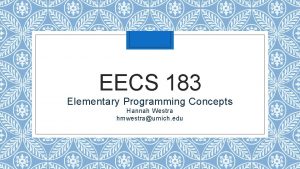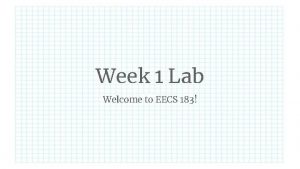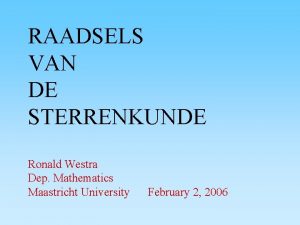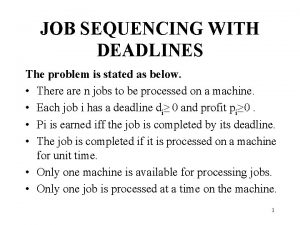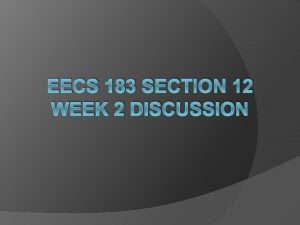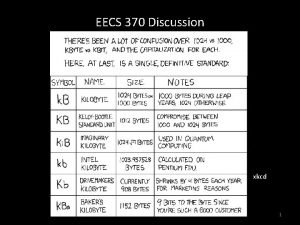EECS 183 DISCUSSION 7 Hannah Westra Upcoming Deadlines


![Array Declaration and Initialization int my_array[5]; int my_array[] = {1, 2, 3, 4, 5}; Array Declaration and Initialization int my_array[5]; int my_array[] = {1, 2, 3, 4, 5};](https://slidetodoc.com/presentation_image_h2/4e794aa985297cab113b9aa27641dcf5/image-3.jpg)

![Iterating through Array string hamsters[3] = {“Pepé”, ”Hammy”, “Fluffy” }; ◦ What does hamsters Iterating through Array string hamsters[3] = {“Pepé”, ”Hammy”, “Fluffy” }; ◦ What does hamsters](https://slidetodoc.com/presentation_image_h2/4e794aa985297cab113b9aa27641dcf5/image-5.jpg)



![Initializing all to 0 ◦ 1 -dimensional array: int board[3] = {0}; ◦ 2 Initializing all to 0 ◦ 1 -dimensional array: int board[3] = {0}; ◦ 2](https://slidetodoc.com/presentation_image_h2/4e794aa985297cab113b9aa27641dcf5/image-9.jpg)
![Initializing Directly const int HEIGHT = 3; const int WIDTH = 4; int board[HEIGHT][WIDTH] Initializing Directly const int HEIGHT = 3; const int WIDTH = 4; int board[HEIGHT][WIDTH]](https://slidetodoc.com/presentation_image_h2/4e794aa985297cab113b9aa27641dcf5/image-10.jpg)







- Slides: 17

EECS 183 DISCUSSION 7 Hannah Westra

Upcoming Deadlines ◦ Assignment 3 Due Today (10/21) at 6: 00 pm ◦ Project 3 Due Next Friday (10/28) at 6: 00 pm ◦ Partners ◦ For projects 3 and 4, you are allowed to have a partner ◦ Ohhi ◦ http: //0 hh 1. com/ ◦ Get started early!
![Array Declaration and Initialization int myarray5 int myarray 1 2 3 4 5 Array Declaration and Initialization int my_array[5]; int my_array[] = {1, 2, 3, 4, 5};](https://slidetodoc.com/presentation_image_h2/4e794aa985297cab113b9aa27641dcf5/image-3.jpg)
Array Declaration and Initialization int my_array[5]; int my_array[] = {1, 2, 3, 4, 5}; int my_array[5] = {1, 2, 3, 4, 5}; int my_array[8] = {1, 2, 3, 4, 5}; //compiler will insert 0’s after 5 th elt ALL VALID

Passing arrays to functions ◦ Arrays are always passed by reference – no & needed void use. Array(int arr[], int size); //prototype ◦ You cannot return an array from a function (a function’s return type cannot be an array) ◦ This is okay, because since the array is passed by reference, you can directly modify it in the function ◦ const Modifier? ◦ void print. Results(const int arr[], int size)
![Iterating through Array string hamsters3 Pepé Hammy Fluffy What does hamsters Iterating through Array string hamsters[3] = {“Pepé”, ”Hammy”, “Fluffy” }; ◦ What does hamsters](https://slidetodoc.com/presentation_image_h2/4e794aa985297cab113b9aa27641dcf5/image-5.jpg)
Iterating through Array string hamsters[3] = {“Pepé”, ”Hammy”, “Fluffy” }; ◦ What does hamsters refer to? What will print if you cout << hamsters ? ◦ The memory address of the first element of hamsters[0] ◦ Example output: 0 x 00387 A 00 ◦ Use loops to access elements in arrays for (int i = 0; i < 3; i++) { cout << hamsters[i] << endl; }

Practicing Using 1 D Arrays 1) Write a function that takes in an array of type integer, and prints the sum of the elements 2) Write a function that takes in an array of type integer, and replaces any negative number with its absolute value 3) Write a function that takes in an array of type boolean, and returns whether the array is more true or mostly false 4) Write a function that takes in an array of type string, and prints out every string that starts with the letter ‘p’ or ‘h’ 5) Write a function that takes in an array of type double and round every element to its closer integer


2 D Arrays ◦ You can visualize these like a matrix, or game board! ◦ ALWAYS: arr[row][col] ◦ You’ll often see ‘col’ in place of column [0][0] [0][1] [0][2] [1][0] [1][1] [1][2] [2][0] [2][1] [2][2]
![Initializing all to 0 1 dimensional array int board3 0 2 Initializing all to 0 ◦ 1 -dimensional array: int board[3] = {0}; ◦ 2](https://slidetodoc.com/presentation_image_h2/4e794aa985297cab113b9aa27641dcf5/image-9.jpg)
Initializing all to 0 ◦ 1 -dimensional array: int board[3] = {0}; ◦ 2 -dimensional array: int board[3][5] = {0}; ◦ Both of these initialize every element in the array to 0 ◦ THIS IS ONLY THE CASE WITH 0 – if any other number is between the brackets, it sets only the first element to that number, and sets all the rest to zero
![Initializing Directly const int HEIGHT 3 const int WIDTH 4 int boardHEIGHTWIDTH Initializing Directly const int HEIGHT = 3; const int WIDTH = 4; int board[HEIGHT][WIDTH]](https://slidetodoc.com/presentation_image_h2/4e794aa985297cab113b9aa27641dcf5/image-10.jpg)
Initializing Directly const int HEIGHT = 3; const int WIDTH = 4; int board[HEIGHT][WIDTH] = { {1, 2, 3, 4}, {5, 6, 7, 8}, {9, 10 , 11, 12} }; ◦ You can also initialize all to the same thing, using nested loops

When Initializing Which of these is invalid? With a 2 -dimensional array, the compiler absolutely needs to know the column (the second parameter) size at compile time The row is optional int data[10][2]; int data [4][]; COMPILER ERROR! int data [][3] = {{1, 2, 3}, {4, 5, 6}};

How do we declare and initialize our own 2 -d array ◦ Let’s say we want the values to increase: 1, 2, 3, 4, 5, 6, 7, 8, 9 How would we print this 2 D array?

What if we want to print it backwards?


2 D Array Wrap Up ◦ There a lot of examples from last lecture – go through them in detail! ◦ Any questions? ◦ Understanding arrays is very important for project 3

Questions?

Upcoming Deadlines ◦ Assignment 3 Due Today (10/21) at 6: 00 pm ◦ Project 3 Due Next Friday (10/28) at 6: 00 pm ◦ Partners ◦ For projects 3 and 4, you are allowed to have a partner ◦ Ohhi ◦ http: //0 hh 1. com/ ◦ Get started early!
 Hannah westra
Hannah westra Eecs 183
Eecs 183 Hannah westra
Hannah westra Katherine kampf
Katherine kampf Eecs 183
Eecs 183 Eecs 183 lab 8
Eecs 183 lab 8 Ronald westra
Ronald westra Ronald westra
Ronald westra Ronald westra
Ronald westra Zonnedak westra
Zonnedak westra Snaar theorie
Snaar theorie Simple distillation discussion
Simple distillation discussion Soa exam p registration
Soa exam p registration Managing multiple projects objectives and deadlines
Managing multiple projects objectives and deadlines Lonestar nursing deadlines
Lonestar nursing deadlines Uab deadlines
Uab deadlines Uf thesis deadlines
Uf thesis deadlines Complexity of job sequencing with deadline
Complexity of job sequencing with deadline




